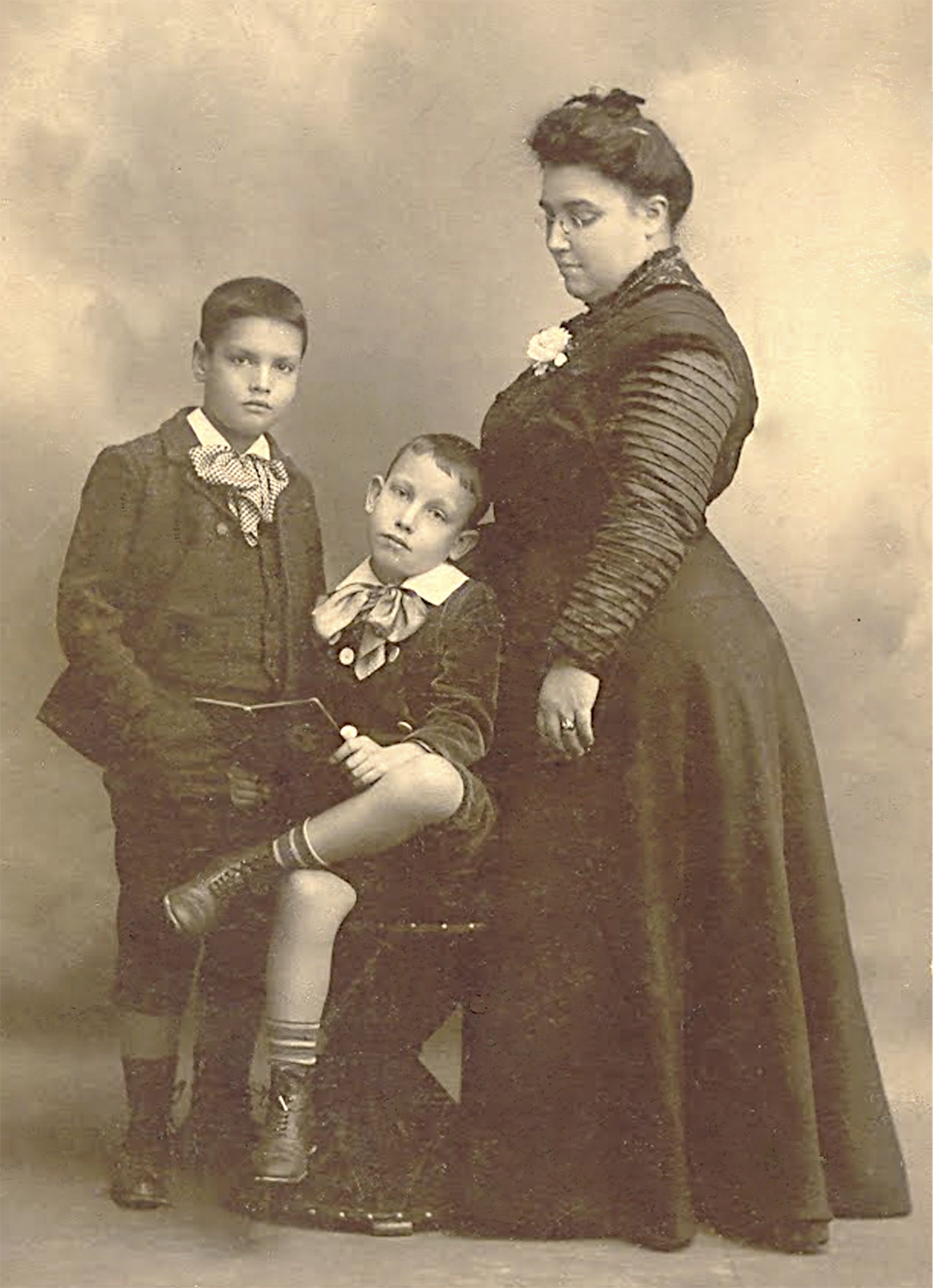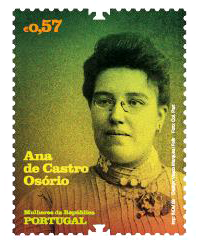
Ana de Castro Osório was born on the 18th of June of 1872, in Mangualde, a city located in the district of Viseu, having moved to Setúbal in 1894, with her parents and three siblings.
A few years later, in 1898, she married Francisco Paulino Gomes de Oliveira, a poet and Republican activist, with whom she had two children. Following a brief period living in Brazil, where Francisco de Oliveira held the position of consul of Portugal, Ana Osório returned to her homeland in 1914, as a result of her husband´s death, having then settled in Lisbon.
Regarded as one of the founders of Portuguese child literature, she had already published, in 1897, her first book of short stories, Para as Crianças (For the Children, which was also the name attributed to a publishing company that she created, responsible for the release of this and other books), grounded on oral tales and traditional stories. Furthermore, between 1907 and 1908, she wrote for and ran O Jornal dos Pequeninos, in Setúbal, a newspaper directed towards an infantile audience, whose distribution was free.
A fiery supporter of the republican ideals, for which she fought while the monarchic regime was still present, Osório maintained that the Republic represented the only possible way towards the progress of civilization. In parallel and accordance with her progressive spirit, she was also an activist for women´s rights, having published, in 1905, the first Portuguese feminist manifesto, To the Portuguese Women.

Ana Osório e os filhos.
Additionally, she was one of the founders of the Republican League of Portuguese Women, the first female association ever created in the country, whose purpose was to intertwine political intervention with demands of female nature. However, a quarrel soon erupted within the group, mostly due to the opposing views of Ana Osório and Maria Veleda in what concerned the female vote and the issue of religion, leading Osório to renounce the presidency of the League and subsequently create the Association of Feminist Propaganda, an organization exclusively focused on women´s suffrage and on overcoming obstacles imposed to the progress of women in society. During this period, she also wrote several articles for the newspapers of the time, as well as for the organs of the press spawned by the two organizations to which she was linked.
In 1916, while supporting the entrance of Portugal into World War I, she participated in the organization of the Portuguese Women´s Crusade, a female charity movement that aimed to provide moral and material support to Portuguese soldiers sent to war.
Ana Osório died in Lisbon, on the 23rd of March of 1935. Her funeral was attended by personalities of distinct backgrounds, among them Regina Quintanilha, Fernanda de Castro, Maria Veleda, João de Barros, António Sérgio, Aquilino Ribeiro, Rodrigues Miguéis and Hernâni Cidade.
On the 5th of October of 2009, the CTT (Postal Services of Portugal) issued a collection of stamps intended to pay tribute to a group of “women whose actions and testimonies transformed them into figures indelibly associated with the history of the Republic”. Such collection, aptly titled Women of the Republic, “evokes activists of female rights from the early days of the Republic”, and in it one can find Ana de Castro Osório, along with Maria Veleda, Carolina Michaëlis de Vasconcelos, Angelina Vidal, Adelaide Cabete, Carolina Beatriz Ângelo, Virgínia Quaresma and Emília de Sousa Costa.
*****
Ana de Castro Osório nasceu em Mangualde, a 18 de Junho de 1872, tendo-se mudado para Setúbal, com os seus pais e três irmãos, em 1894.
Poucos anos depois, em 1898, casou com Francisco Paulino Gomes de Oliveira, um poeta e activista republicano, de quem teve dois filhos. Após um breve período a viver no Brasil, onde o marido exerceu o cargo de cônsul de Portugal, regressa à pátria em 1914, na sequência da morte deste, para se fixar definitivamente em Lisboa.
Tida como uma das criadoras da literatura infantil portuguesa, Osório já havia publicado, em 1897, o seu primeiro livro de contos, Para as Crianças (nome igualmente atribuído a uma editora por si fundada, responsável pela publicação desta e de outras obras), alicerçado em contos e histórias tradicionais disseminadas por via oral. Adicionalmente, editou e escreveu, entre 1907 e 1908, para O Jornal dos Pequeninos, em Setúbal, cuja distribuição era gratuita.
Acérrima defensora dos ideais republicanos, pelos quais se bateu enquanto a Monarquia estava ainda vigente, Osório considerava que a República configurava o único caminho possível rumo ao progresso civilizacional. Em paralelo e consonância com o seu espírito progressista, foi também activista dos direitos da mulher, tendo publicado, em 1905, o primeiro manifesto feminista de que há registo em Portugal - Às Mulheres Portuguesas.
A este respeito, foi também uma das fundadoras da Liga Republicana de Mulheres Portuguesas, a primeira associação feminina criada no nosso país, que visava entrelaçar a intervenção política com as exigências de foro feminino. Contudo, a discórdia instalou-se no seio deste grupo, sobretudo em virtude das posições antagónicas de Ana Osório e Maria Veleda no que respeitava ao voto feminino e à questão religiosa, pelo que Osório decidiu abdicar da presidência da Liga e fundar a Associação de Propaganda Feminista, uma organização exclusivamente focada no voto feminino e em obstáculos ao progresso das mulheres na sociedade. Durante este período, redigiu também diversos artigos para os jornais da época e para os órgãos de imprensa de ambas as associações a que esteve ligada.
Em 1916, após regressar da sua estadia no Brasil, exerceu o cargo de subinspectora do trabalho da 1ª Circunscrição Industrial do Ministério do Trabalho, tendo sido este o único cargo estatal que ocupou. No mesmo ano, apoiando a entrada de Portugal na Primeira Guerra Mundial, participou na organização da Cruzada das Mulheres Portuguesas, um movimento de beneficência feminino, cujo propósito era o de prestar auxílio moral e material a soldados portugueses mobilizados para a guerra.
Morreu em Lisboa, a 23 de Março de 1935. No seu funeral, compareceram figuras de áreas distintas, entre as quais Regina Quintanilha, Fernanda de Castro, Maria Veleda, João de Barros, António Sérgio, Aquilino Ribeiro, Rodrigues Miguéis e Hernâni Cidade.
A 5 de Outubro de 2009 os CTT fizeram uma emissão filatélica com o objectivo de homenagear um grupo de “mulheres cuja acção e testemunho as tornaram figuras indelevelmente associadas à história da República”. Esta coleção, denominada Mulheres da República, “evoca activistas dos direitos femininos dos primeiros tempos da República”, e dela faz parte Ana de Castro Osório, juntamente com Maria Veleda, Adelaide Cabete, Angelina Vidal, Carolina Beatriz Angelo e Carolina Michaëlis de Vasconcelos, Virgínia Quaresma e Emília de Sousa Costa.

Pelo Edital de 19 de junho de 1976 foi dado o seu nome a uma rua da urbanização Quinta dos Condes de Carnide.
References:
- Ana de Castro Osório, wikipédia.
- Women Writers in History Database, Ana de Castro Osório.
- FIADEIRO, M. A., Ana de Castro Osório, in Catálogo da Exposição Mulheres Século XX: 101 livros, org. CML – Departamento da Cultura, 2001, pp. 246-247.
- VILAR, Anita, Panorama de uma História Local no Feminino, Centro de Estudos Bocageanos, 2013.
- Selos de Portugal - Álbum XII (2009), Carlos Kulberg, Edições Húmus, 2010.
- Toponímia de Lisboa, Rua Ana de Castro Osório.